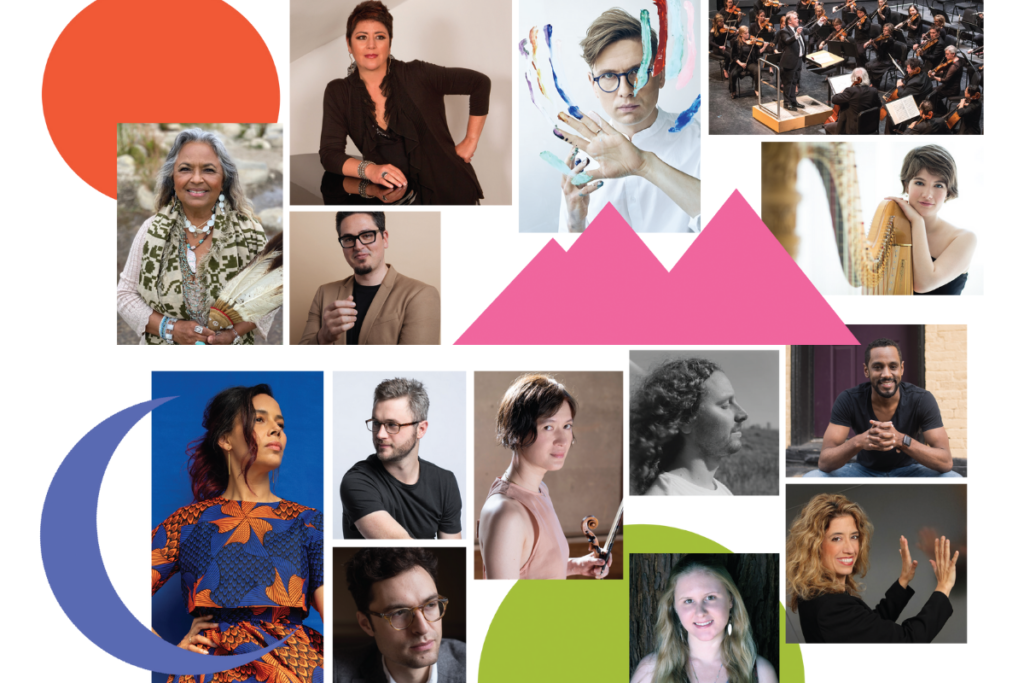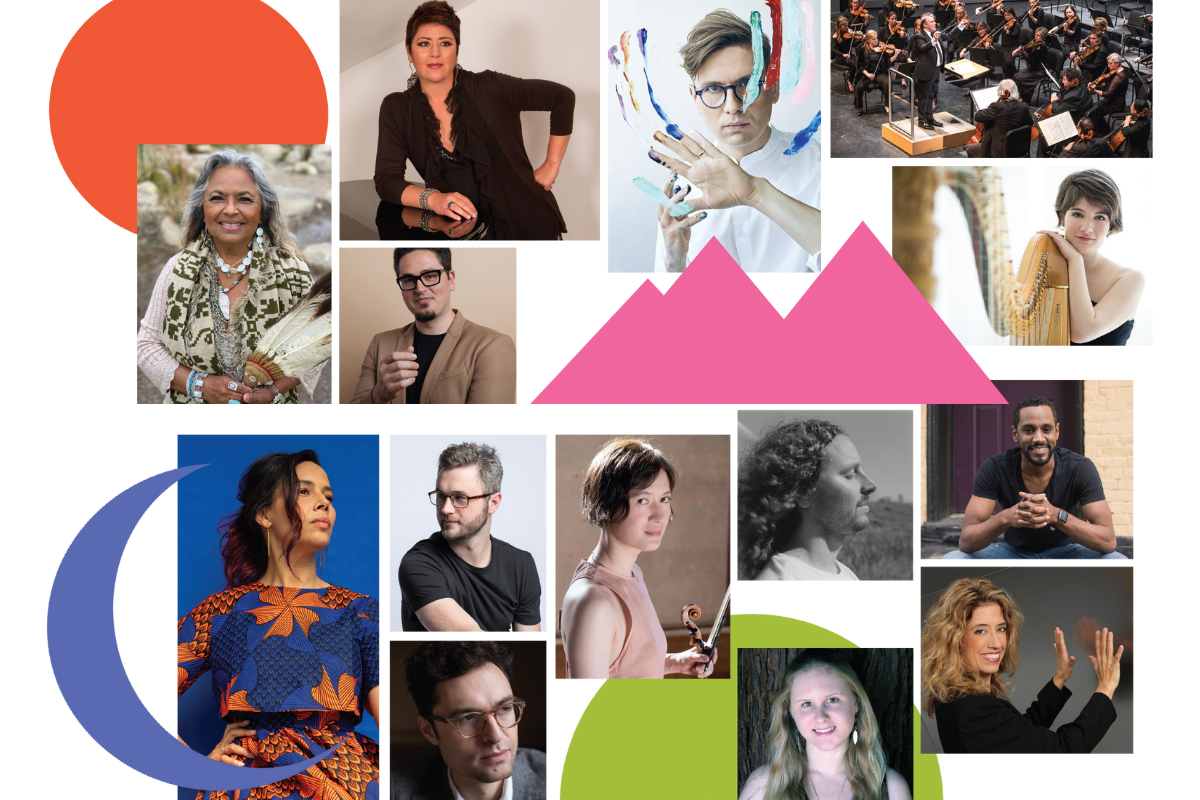
If the Ojai Festival aged like a human being, the formidable storehouse of memories it has already accumulated would likely tilt the spotlight of this 75th anniversary edition toward the past — perhaps in the form of a retrospective celebrating highlights of these many decades. But the very spirit of Ojai — its open-eared curiosity and resistance to received ideas — evades that kind of chronological, linear account-taking.
The dislocations caused by the pandemic, the implications of which are still unfolding, have even triggered something of a Benjamin Button effect. After the long, traumatic abstention from live performance, it feels as though we’re aging backwards as we reconsider the basic issues we may have thought long since sorted out. And the urgency of today’s social justice consciousness has intensified a desire to hit the restart button. Acting your age, in this age, is to make room again for a radical hope that not so long ago might have seemed utopian overreach.
“This year’s Ojai Festival brings a real focus to young talent: especially young composers, but also young performers,” says Music Director John Adams, who previously served in that role in 1993. Even though much of the programming was envisioned prior to the pandemic, Adams instinctively chose the future as the vanishing point for his image of musical vitality.
Not that this is a new outlook for the eminent composer. Born in the same year as the inaugural Ojai Festival, Adams himself has steadfastly resisted the temptation to settle into comfortable habits and predictable patterns even while being increasingly feted as a musical sage. Anyone who comes to his work with expectations still constrained by such long-outdated pigeonholes as “Minimalism” is bound to be astonished by his tireless development of a complex musical language — and particularly by the paths he has followed over the past 15 years.
Aside from his own composing career, Adams has long been committed to mentoring the new generation through his involvement in teaching, curating, and commissioning. Not long after resettling from his native New England to the Bay Area in the 1970s, he led a new music ensemble at the San Francisco Conservatory that presented many premieres and experimented with fresh voices. “I was thinking about what has really meant the most to me over the years, and particularly now, at my age, it is my relationships with these younger composers,” Adams says.
Ojai Festival’s Artistic and Executive Director Ara Guzelimian recalls that Adams insisted on this focus on the future early on: “When he began thinking about this summer’s program, he became so determined that even though this is an anniversary festival it should not be a retrospective in any sense — and that it should not be centered around his music. This idea of bringing discoveries of new composers to the audience is very fitting for Ojai. He wanted the takeaway of this Festival to be an exploration of the next generation — the ultimate act of optimism, because they are the ones who will carry us forward.”
But what does Adams find so promising in these young artists? Above all, it’s their openness to inspiration from all directions — temporally and across genres, from the classical tradition, from its avant-garde fringes, from the by-now inextricably interwoven discourses that fuel our many-layered musical lives. Composers like Carlos Simon are navigating new ways of relating to an increasingly interrogated canon while at the same time honoring the authenticity of voices that it has historically marginalized. “I’m excited that at this Festival we have such a broad bandwidth of talent and also backgrounds,” says Adams.
Guzelimian adds: “If there is one takeaway from the 75th anniversary Ojai Festival, it might be that there is health in being poly-stylistic.” In this sense, the composers and performers featured over this intense, long weekend of music-making mirror the identity that the Ojai Festival itself has cultivated over its history: an openness to new sounds, unusual combinations, uninhibited fusions and even contradictions, and, above all, to the possibility of genuine epiphanies amid these uncertain, fearful times. Sometimes, this might even be an attempted recovery of what was once known as a sense of the sublime, as we encounter in the world premiere of Dylan Mattingly’s Sunt Lacrimae Rerum.
Mattingly is among the California composers who have a particularly strong presence in Adams’s lineup — along with Gabriella Smith, Samuel Adams, and Anthony Cheung. This in turn represents a subsidiary theme of “homecoming” and a West Coast sensibility that runs through the programming — though this, too, cannot be reduced to a single trend. Gabriela Ortiz, the outstanding Mexican composer, extends this geographical orientation further and offers a potent counterweight to the Eurocentric focus that has so long dominated discussions of new music. “I think that music is very interested in other latitudes and other cultures, that the future is no longer limited to European aesthetics, as we were taught in the past,” Ortiz emphasizes.
And through the participation of Julie Tumamait- Stenslie, a modern-day leader of the peoples who originally inhabited this magical paradise-on-earth, we acknowledge the enduring presence of the Chumash people. They have given this place its name: “Awhay,” meaning “moon” or “lunar phase” — changed to “Ojai” to make it easier to pronounce — was chosen to replace the Germanic “Nordhoff” in the wake of the First World War.
Adams’s choice of performers likewise intensifies the focus on a fresh, youthful perspective that is redefining the entire field. Just before the pandemic shutdowns began, Adams got to spend time touring with Víkingur Ólafsson for some of the first European performances of his dazzling new piano concerto Must the Devil Have All the Good Tunes? “Not only
is Víkingur a phenomenal pianist, he also has an amazing creative mind,” Adams remarks, referring to the Icelandic pianist’s equally convincing approach to well-known repertoire and new scores.
Like the featured composers — including fellow pianist Timo Andres — Ólafsson approaches inherited tradition as a contemporary language, transforming it into an inescapably thrilling new experience. By the same token, the Attacca Quartet and Miranda Cuckson bring to the new scores they interpret a conviction that confers on them the sense of longstanding authority. And the incomparable Rhiannon Giddens is such a natural fit for Ojai that it’s surprising this summer marks her debut at the Festival. “She seemed to John and to me to be ideal,” recalls Guzelimian, “because she is one of the most genuine pan-stylistic artists I know. She’s somebody who really is deeply rooted and convincing in a wide variety of musics.”
If there is no overarching trend among the composers and performers who are shaping music’s future, there is a shared value — the value of acting their age, as Guzelimian puts it, recalling how Esa-Pekka Salonen was criticized at the beginning of his tenure with the LA Philharmonic for playing “too much” contemporary music: “He responded: ‘When I conduct Lutosławski’s music, I bear the same relationship and age to him as Karajan did to Richard Strauss.’ What he was essentially saying is, ‘I’m acting my age, I’m bringing forward what I know and love.’
I think this current generation is the least inhibited yet in drawing on the multiplicity of musics that they know.”
- Thomas May

